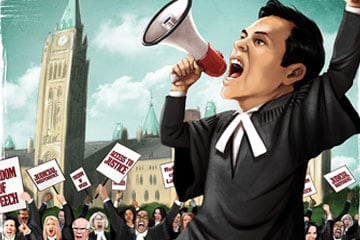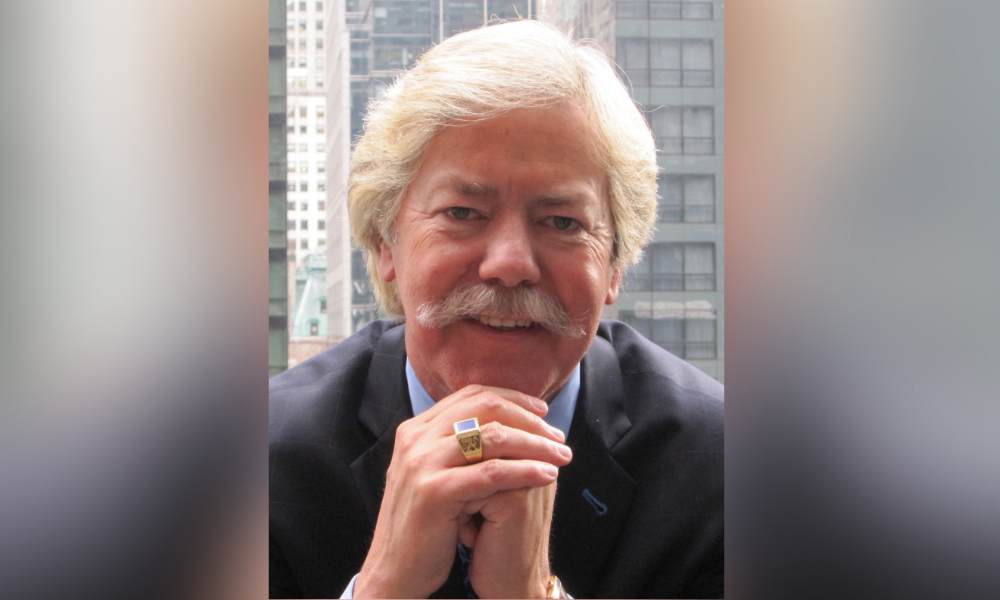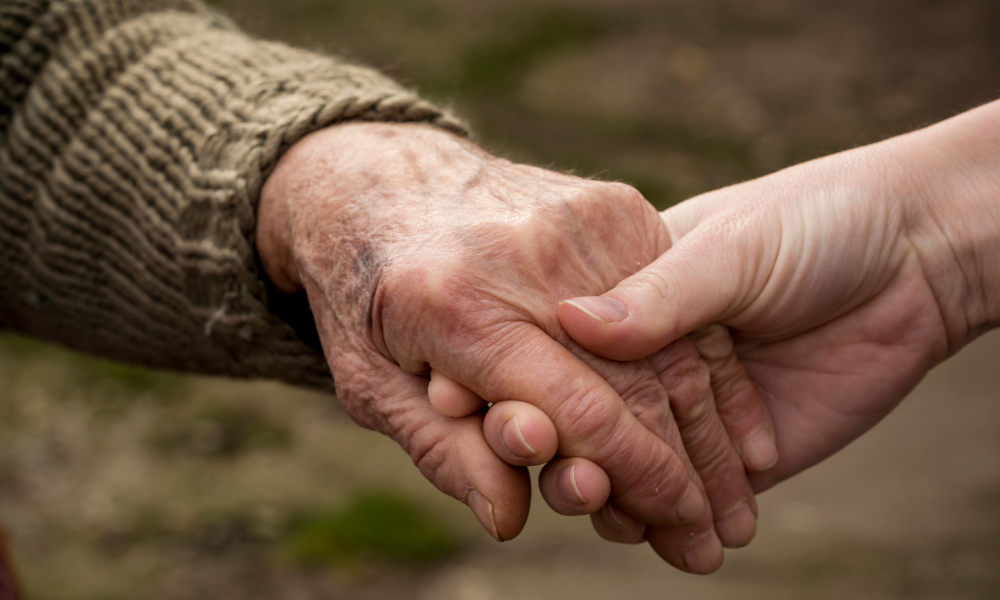Lawyers in Pakistan have been pushing for regime change. Could or should that ever happen in Canada?

Lawyers in Pakistan have been pushing for regime change. Could or should that ever happen in Canada?
Is it ever OK for a bar association to be politically partisan? I don’t mean making technical criticisms of proposed legislation or that sort of thing. Bar associations are often involved in the government process in that way — it’s fine and, indeed, often helpful. I don’t think such activity could be described as partisan. No, I’m talking about actively opposing policy in some broad way, being generally opposed to a government and its objectives or supporting opposition to the government. I’m talking about trying to hobble or even replace a government or its leader.
Your instinctive response, I’m sure, is that in a country like Canada it’s not the job of the organized legal profession to oppose government. Individual lawyers, of course, may be partisan and active politically, but it would be inappropriate, even dangerous, for bar associations to do collectively what their members are free to do individually, to oppose political platforms or policy or to try and constrain or even replace a government.
Is that always true or does the calculus change if a country is in or near a state of crisis? When U.S. President Donald Trump imposed the first version of his infamous travel ban in January, thousands of U.S. immigration lawyers, including lawyers from major firms, went to airports to help those affected. Mostly, this was spontaneous and unorganized, but some legal organizations — such as the American Civil Liberties Union — had an important co-ordinating role. Mind you, as interesting as this event was, it fell far short of a partisan and concerted effort by the legal profession as a whole. And the initiative was in response to a particular executive order promulgated by the president and hardly a frontal and comprehensive attack on the Trump administration.
But suppose things got a lot worse. Suppose the very rule of law was in jeopardy because of a government’s action and attitude. Suppose a government was trying to suppress freedom of speech. Suppose that part of government repression was attacking the legal profession itself — perhaps even throwing lawyers who opposed the regime in jail. Let’s say, in this hypothetical case, it was clear that the government had to be replaced before the situation could improve.
What are the ethical obligations of individual lawyers and the organized legal profession in circumstances like these? An individual lawyer is obliged to protect and enhance justice and access to justice (not all do). A bar association, or any lawyers’ organization, is likewise obliged to protect and enhance justice (this doesn’t always happen). These are fundamental ethical obligations. At the end of the day, this is what being a lawyer is all about. But what kind of action, exactly, in the so-called real world, do these obligations require?
Consider Pakistan as a case in point. In that country, the government and the legal profession have long been at odds with one another. In 2007, something called The Lawyers’ Movement began a complicated and sometimes violent series of protests against the suspension, in March of that year, of Chief Justice Iftikhar Muhammad Chaudhry by President Pervez Musharraf, who alleged misconduct and misuse of authority by the chief justice. (The real reason for the suspension was that Chaudhry was no friend of the government and the prime minister wanted to get rid of him.) In November 2007, police raided the Lahore High Court Bar Association, using batons and tear gas, and arrested more than 800 lawyers, including judges. Even the Law Society of Upper Canada was upset and issued a statement, which began: “The actions of President General Pervez Musharraf are blatant violations of fundamental human rights under international law and unacceptable attacks on the independence of the judiciary, the bar, and the rule of law.”
The Lawyers Movement (supported by most but not all lawyers in Pakistan) has continued to oppose the government. Most recently, on May 20, the Supreme Court Bar Association and the Lahore High Court Bar Association issued a joint statement: “Both bar associations are of the view that in light of the Supreme Court’s ruling on the Panama Papers case (that questioned the moral authority of the premier to rule), PM Nawaz Sharif should no longer hold his office and should therefore resign.” The bar associations gave the prime minister seven days to go. They threatened a nationwide movement against him. In July, the Pakistani Supreme Court disqualified Sharif from holding elected office and he finally resigned.
It’s difficult to criticize Pakistan’s legal profession for the action it has taken. It would be easier to criticize Pakistani lawyers had they done nothing.
What if the United States turned into Pakistan? Preposterous, you say? When the courts blocked Trump’s first immigration executive order, the president said the “so-called judge” had made a “ridiculous” decision, and he later said the courts “seem to be so political.” When his executive order withholding federal funding from sanctuary cities was blocked by a federal district judge in April, Trump commented, “This case is yet one more example of egregious overreach by a single, unelected district judge.” Charles Geyh, an Indiana University law professor who writes about judicial conduct and ethics, told The Washington Post: “Presidents have disagreed with court rulings all the time. What’s unusual is he’s essentially challenging the legitimacy of the court’s role. And he’s doing that without any reference to applicable law. That they are blocking his order is all the evidence he needs that they are exceeding their authority.” Challenging the legitimacy of the court’s role without reference to applicable law — is this how the unravelling begins?
What is the tipping point? When is it time for a lawyers movement to oppose government? Fortunately for Canadians, such a question seems — to say the least — highly theoretical when it comes to our country. But, in many places around the world, it is not theoretical at all.
Philip Slayton is working on a new book about freedom in Canada. How To Be Good: The Struggle Between Law and Ethics, a collection of these columns, will be available in October.











